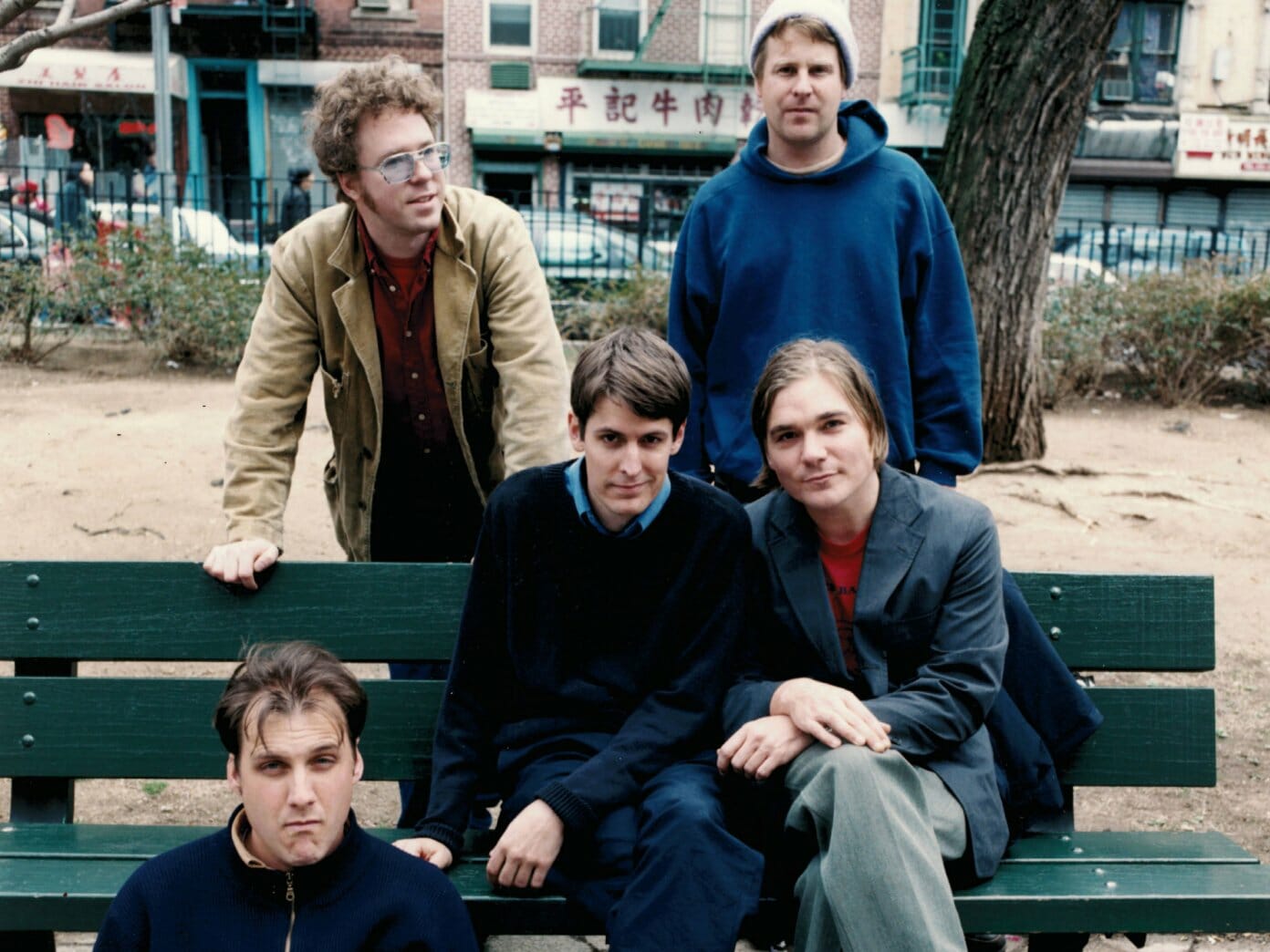Pavement: Quarantine the Past

Stephen Malkmus doesn’t mind saying no, as Jeff Tweedy learned the hard way. Around 2015, the Wilco frontman threw out an offer for Pavement to headline a tour with his equally revered band, a surreal meeting of two defining turn-of-the-Millennium musical voices. But, alas, that potentially internet-breaking blogger fantasy was not meant to be.
“It was Jeff emailing and saying, ‘Hey, would you be interested?’ But Steve didn’t want to do it. And a couple of other guys didn’t want to do it—not because they didn’t like Wilco. It just wasn’t really the right thing to do,” Pavement guitarist, songwriter and co-founder Scott Kannberg says. “Our agent would get calls every year saying, ‘Would Pavement do a festival?’ But we never really got any big offers. Steve was pretty busy doing his stuff, and I was busy doing my solo stuff so I don’t think it would have felt right yet. In 2020, it would have felt right but, unfortunately, we had to wait.”
As the guitarist, who records as Spiral Stairs, is recounting a few of the times his band didn’t agree to reunite, he’s actually in the midst of preparing for a time that they did. In May, Pavement— Kannberg, frontman Malkmus, bassist Mark Ibold, drummer Steve West and multi-instrumentalist Bob Nastanovich— came together for a warm-up show at Los Angeles’ Fonda Theatre and more proper appearances at the Barcelona, Spain, and Porto, Portugal editions of Primavera Sound. And, from September until at least early 2023, the group will embark on an international headlining tour. It’s Pavement’s second major campaign since formally disbanding in 1999, and first since their only other high-profile regrouping came to a close in 2010.
“As with most things Pavement, it’s very passive and there’s no real organization,” the guitarist says with a laugh of the group’s reactivation. “It’s one of those conversations that always comes up randomly, either through a band or a festival throwing out an offer. [After the Wilco tour fell through], our agent, thought, ‘Well, maybe I’ll put the feelers out the next couple of years.’ The Primavera folks were the first to bite.”
Kannberg had been living in Mexico for four years before COVID hit and then returned to Australia, where he had previously resided, for about 18 months. He’s currently based in Cambridge, Calif.; luckily, his parents had a house that his sister had been renting out, which allowed him to prepare for Pavement’s upcoming run and further avoid any of Australia’s potentially strict lockdowns.
“Generally, the way things work is that everybody in the band will put down what they’re doing and do it,” Nastanovich says of Pavement’s reunion. “The people who decide whether to get the ball rolling are our booking agent and Stephen Malkmus. That’s our strategy and decision team. The other four of us are gonna seize the opportunity because we loved being in the band in the ‘90s. It’s this significant part of our lives, and it’s always a lot of fun for us. We did have some rare moments and no band gets along perfectly but, at least from a personality perspective, we enjoy each other, and we’ve been around each other for a long time.”
Nastanovich has long been the band’s deepest tie, at least visually, to Pavement’s punky, DIY roots—a percussionist, keyboardist, sometimes vocalist and unofficial emcee who gave their early gigs a medicine-show feel. He currently lives worlds away from any music industry hub in Paris, Tenn., where he focuses on his interest in horseracing; he is famously the first American citizen to attend a horse race at all 60 major U.K. tracks.
The group’s original plan was to reunite at the 2020 Primavera Festival, potentially launching an international tour later on depending on how those appearances went. However, in an all too familiar tale, their Primavera sets ended up being postponed a full two years due to COVID and will now flow right into their more ambitious headlining run.
Before their Los Angeles underplay— which was announced shortly before Primavera—the members of Pavement reconvened in Portland, Ore., where Malkmus is currently based, to run through a mix of ideas and catch up as friends and bandmates.
“On varying levels, we keep in touch with each other,” Nastanovich says. “We generally see each other when we’re in the same town. You have less in common as you get older. When you spend so much of your life with somebody—in regular situations and high-pressure ones—that’s just the way that it goes. It’s probably good in a way. Everybody, as far as I can tell, respects each other and practice was very productive. I’m glad we did it how we did it. You don’t wanna play in front of a bunch of rock critics in Chicago, for example, as your first gig.”
“With the big 2010 reunion, everything was planned out as one long year or a year and a half,” Kannberg says. “We toured for a few months at a time so it wasn’t that bad to be away from our families. Everybody traveled together. But this time around—because we’d already had that past experience and we were excited about the tour—we all got together and rehearsed for like two weeks, which is pretty rare in the Pavement world. In the old Pavement world, it was pretty rare to rehearse at all.”
Kannberg describes the experience as almost like summer camp—or as close to summer camp as the 50-something-year[1]old members of an indie-rock band can get. They all met at the airport or hotel, and then hunkered down at a small practice space to riff on their songs. West spent weeks relearning his parts before arriving in Portland, even brushing up on material the band recorded before he joined.
“His preparation was pretty remarkable,” Nastanovich interjects. “Stephen did a fair amount of practicing on his own—Scott and Mark as well. And I, well—if you play Moroccan tambourines and cowbells, you can’t really practice.”
“Everybody basically looks the same and everybody, except me, still has their hair,” Kannberg says. “Everybody’s got the same personalities, the same jokes. For me, it was hard to remember some things. When you get together with the band, you kind of forget, ‘Oh, I gotta play it this way, or I got to play it that way.’ Steve’s very patient with everyone, which is nice.”
Nastanovich estimates that they are currently comfortable with about 60- 70 Pavement songs. “I can’t imagine paying $80 to see really anybody,” he says. “So, we’re conscious of the fact that people are paying to see us. And all credit has to go to our chief composer, and that’s Malkmus. The guy’s good at what he does. He’s probably better at songwriting than any other aspect of being a musician. And he’s pretty good at everything.”
***
By this point, Pavement’s story has long been codified into rock-and-roll history. Childhood friends Malkmus and Kannberg started the group as a lo-fi recording project in Stockton, Calif., in 1989. They expanded their lineup to include drummer Gary Young soon after, before bringing Ibold and Nastanovich aboard in 1991. In 1993, they dismissed the often erratic Young and hired West, completing the group’s longest-running ‘90s lineup. Pavement spent the rest of the decade building an organic underground following, thanks to their angular guitar lines, conversational lyrical imagery and overall loose, slacker ethos. As the ‘90s came to a close, the group’s relationship with Malkmus started to strain and he officially put Pavement on ice to focus on a solo career
The rest of the band pivoted in different directions. Kannberg continued to turn out solo releases, West switched careers and became a stonemason, Nastanovich held a variety of jobs in the horse-racing industry and Ibold primary worked as a bartender and food journalist in New York, though he did play bass with Sonic Youth for a few years, too.
“Pavement did things the old-fashioned way,” Nastanovich says. “We are normal people who bought a lot of records when we were teenagers, listened to music constantly and, thankfully, had a few talented people in the band who were able to make some cool songs that were influenced by whatever they were listening to. And, fortunately, we were in the right places at the right times. We are the lucky ones.”
Malkmus formed his enduring group the Jicks; his songs remain decidedly Pavement-adjacent, though he has embarked on some more jammy guitar journeys over the years and become a regular presence on the festival circuit. On his own, he has also flirted with electronic music, cosmic folk and the occasional Grateful Dead tribute project.
And, like The Vevlet Underground and Big Star before them, Pavement’s shadow continued to expand in their absence. Everyone from Nickel Creek to Ben Lee has covered their music; The Black Keys’ Patrick Carney has cited them as an influence; The National included the longing line, “Praying for Pavement to get back together” on “So Far Around the Bend.” They also received an unexpected injection of new fans on the other side of the then more defined hippie/ hipster divide when Trey Anastasio started name-checking the group as an influence at a time when Phish’s music was starting to become looser, funkier and more influenced by acts like The Velvet Underground. Anastasio brought on longtime Pavement collaborator Bryce Goggin to co-produce 2000’s Farmhouse, 2002’s Round Room and most of his best-known solo efforts, and Phish even covered “Gold Soundz” live once in 1999.
“I remember, sometime around ‘97, we were playing in the wintertime in a small place in lower Manhattan. We went backstage and there’s this normal looking dude and he’s a low-talker,” Nastanovich says. “I’m too deaf to hear those and I didn’t recognize him, but he introduced himself to me. And I was like, ‘There’s some guy named Trey in our dressing room—he’s a super nice guy.’ Also, with the later-period Pavement stuff, the songs went away from the two and three-minute form and we released the chains on Stephen and let him play longer. He’s such a fluid guitar player. He can jam with the best of them. That’s one of the reasons why Pavement ended—he wanted to wield his axe.”
“Like Phish or the Dead, we really weren’t the same band every night,” Kannberg says. “We were pretty all over the place, and I think that’s definitely an appeal. Malkmus has gone off into some jam territory in his solo career and, the older we get, the more fun it is to do that. Some of these songs that we’re doing now are definitely taking on new shapes. Everybody is a jamband in the end.”
Kannberg returned the favor by recording a version of Phish’s “Axilla (Part II)” on the 2001 tribute album Sharin’ in the Groove with his Preston School of Industry project. He proudly declares that it was “supposedly the rarest song at that time” and, after hearing that they recently revived the tune for the first time in decades, he adds, “They should try to play it like I did it—a Butthole Surfers version.”
In addition to their 2010 tour, which found the band headlining venues far larger than they did in 1999, the members of Pavement have crossed paths on a few other occasions since the dawn of the 21st century. Malkmus and Ibold shared the stage at Bonnaroo in 2006 when both the Jicks and Sonic Youth were on the bill; Kannberg sat in with the Jicks in Los Angeles in 2014 and both Malkmus and Young participated in Kannberg’s 50th birthday event in San Francisco in 2016. Before COVID shuttered the music industry, Malkmus and Nastanovich also shared the stage at a Portland, Ore. tribute to their former Silver Jews bandmate David Berman, who tragically took his life in 2019.
Like many musicians who pass away too soon, Berman’s work seems to finally have been recognized posthumously.
“I think it’s the responsibility of somebody who’s into poetry or underground music to dig someday like that while they’re still around,” Nastanovich says. “It’s sad, in David’s case. I knew him for 35 years and, in no way shape or form do I think that he would still be alive if he knew that, the year after he died, his fanbase would expand seven times. But it certainly wouldn’t have hurt his feelings on the way out the door. It’s very easy for his hardcore fans to say, ‘This guy’s one of the most brilliant poets, lyricists and songwriters of his generation.’ But it’s sad that he didn’t know how many people appreciated him after he went. It would have warmed his heart.”
***
On their upcoming headlining tour, the members of Pavement find themselves walking a tricky tightrope. They haven’t really been an active band for almost 25 years and they aren’t afraid to admit that the run will help financially, yet they hope to avoid the trappings of a traditional rock-and-roll reunion. It is also not a stretch to say that, at any given show, a large portion of the ensemble’s fans had not seen them live before 2010.
Kannberg plans to borrow a page from the jamband playbook, mixing up Pavement’s setlists every night and spiking the required hits with some true “bust outs.”
“It’s not a nostalgia act, the entity has evolved over the years without really putting any new music out, which is really pretty cool. We tried to think of songs that we hadn’t really played a lot and were kind of fan favorites already, like ‘Harness Your Hopes,’” he says. “We never played that back in the late ‘90s, and now that’s become this huge song for us. So we are going to mix it up, especially during the multi-night runs. Maybe we won’t do ‘Conduit for Sale.’ Bob doesn’t like that—he’s kind of upset about that. It was funny because Steve said, ‘Some of these songs that we made up when we were like 25, it’s hard to sing them at 55.’ And I understand that.
“I don’t mind playing any of them— Steve has a little more of an opinion on that,” he adds. “But, sometimes, I play ‘Two States,’ which I wrote, and maybe I’ve just played it so many times that I would have more fun playing ‘Starlings of the Slipstream.’ I want to try ‘Painted Soldiers’ or ‘Western Homes,’ just so we are not bored.”
“Stephen is always interested in editing my act,” Nastanovich says with a laugh. “I can be a little bit overzealous—I can play too much and overdo it. So, he sorts me out first and says, ‘Don’t do this; do that.’ And then, when we play live, I decide if I’m gonna listen to him or not.”
During the past few years, the band has slowly been reissuing and releasing expanded versions of their records with the help of their longtime label Matador, shedding new light on their catalog. For the new vinyl version of their final album Terror Twilight, they even agreed to give producer Nigel Godrich’s original track order a go. “That wasn’t really the most fun tour to do back at the end of 1999 when we did it,” Kannberg says. “But, I’ve watched some of these old shows and we were great back then. We were a good band, and we were at our most jamband at that time for sure.”
This time around, the group also decided to add a sixth member, Rebecca Cole, who tour managed the Jicks and played in groups like Wild Flag and The Minders. Cole was originally brought on as a keyboardist and synthesizer player, but her role has expanded to include percussion and vocals.
“Stephen made the excellent decision, about mid-2019, that, if we were gonna do these Primavera shows, then we should bring in a sixth musician and there was some talk about who that should be,” Nastanovich says. “We have faith in his decisions when it comes to just about anything music related, and he chose Rebecca. She takes a lot of pressure off of just about everybody in the band, especially on the larger stages that we’re gonna play—which are larger than Pavement played when we existed the first time around. It’s good to have another talented person to do things that only I would have the free time to do, and I’m not anywhere near as skilled as her. So, we’re able to play a lot of songs that we’ve always played better. And then, even more important, we’re able to play like 10-12 songs that we haven’t been able to play— or hardly ever played—live.”
“It used to be that we made the record and then we figured out the songs as we started touring,” Kannberg says. “But now we have the records to go off of and Rebecca’s really good for bringing that element in because none of us could play keyboards or piano or anything. We just kind of faked our way through it on the records, or had other people do it. So now we have someone to do it and it sounds really great.”
The ensemble was also conscious to pick both emerging acts and bands that prominently feature female musicians as their opening acts.
“I think it’s a bad idea to play with bands from your genre or that have a similar audience,” Nastanovich says. “That’s a bad, old-school rock-and[1]roll ploy. If Pavement had ended up playing with Wilco, it’s an overdose of 50-60-something year-old dudes trying to play rock. We’ve made a point to invite lesser known, unheralded, really interesting musical groups to open for us. In a lot of cases, they are half our age. There are some amazing high-quality acts fronted by very talented women going on. We just don’t want it to be some old man, testosterone jam fest, and we definitely don’t want to play with people half our age whose favorite song is ‘Cut Your Hair.’ So it’s just an opportunity to present what we think are really cool bands, from the current generation.
As of press time, Pavement’s run is slated to conclude with a trip to Japan in early 2023, but the musicians admit that they are entertaining some festival offers for next summer. However, they all have other careers to tend to. Malkmus will return to work with the Jicks and Kannberg—who is a resident of both Mexico and Australia and recently self-released the solo record Medley Attack—will likely head back to Australia.
“The person [the reunion] affected the most was maybe Bob because he is pretty entrenched in the horse-racing scene, but he found a way to kind of still do it,” Kannberg says. “Every night, after rehearsal, he was off doing something with horse-racing. But, we had enough advanced warning. We started talking about the Primavera shows in late 2017.”
And can fans expect another Pavement reunion in 2030?
“I’m not saying it’s not the end of Pavement,” Kannberg says. “But, I hope it’s not the end of us doing live shows.”
“I wouldn’t rule out anything,” Nastanovich says. “I keep my expectations low. There’s certainly no plan to go and create or write new material. Stephen’s focus is on his solo career at this point. But, we have six people in our band now. I think the most important thing is to take the 60-70 songs we have at our disposal and play them as well or better than we ever have before. And we’ve got the right personnel and attitude to do that at this point.”








